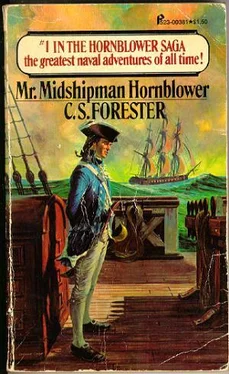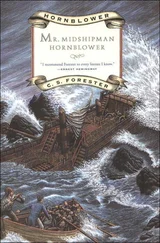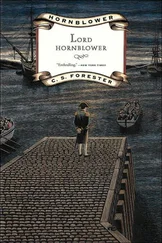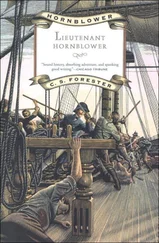Cecil Forester - Mr. Midshipman Hornblower
Здесь есть возможность читать онлайн «Cecil Forester - Mr. Midshipman Hornblower» весь текст электронной книги совершенно бесплатно (целиком полную версию без сокращений). В некоторых случаях можно слушать аудио, скачать через торрент в формате fb2 и присутствует краткое содержание. Год выпуска: 1950, Жанр: Морские приключения, на английском языке. Описание произведения, (предисловие) а так же отзывы посетителей доступны на портале библиотеки ЛибКат.
- Название:Mr. Midshipman Hornblower
- Автор:
- Жанр:
- Год:1950
- ISBN:нет данных
- Рейтинг книги:5 / 5. Голосов: 1
-
Избранное:Добавить в избранное
- Отзывы:
-
Ваша оценка:
- 100
- 1
- 2
- 3
- 4
- 5
Mr. Midshipman Hornblower: краткое содержание, описание и аннотация
Предлагаем к чтению аннотацию, описание, краткое содержание или предисловие (зависит от того, что написал сам автор книги «Mr. Midshipman Hornblower»). Если вы не нашли необходимую информацию о книге — напишите в комментариях, мы постараемся отыскать её.
Mr. Midshipman Hornblower — читать онлайн бесплатно полную книгу (весь текст) целиком
Ниже представлен текст книги, разбитый по страницам. Система сохранения места последней прочитанной страницы, позволяет с удобством читать онлайн бесплатно книгу «Mr. Midshipman Hornblower», без необходимости каждый раз заново искать на чём Вы остановились. Поставьте закладку, и сможете в любой момент перейти на страницу, на которой закончили чтение.
Интервал:
Закладка:
'I'll try,' said Hornblower.
Probably it was as well that Hornblower was provided with the materials for such strenuous mental exercise. The effort of reading French and of studying his profession at one and the same time kept his mind busy during the dreary days while the Pique cruised in search of prizes. Most of the time the Frenchmen ignored him — he had to force himself upon Neuville once to protest against the employment of his four British seamen on the menial work of pumping out the ship, but he had to retire worsted from the argument, if argument it could be called, when Neuville icily refused to discuss the question. Hornblower went back to his quarters with burning cheeks and red ears, and, as ever, when he was mentally disturbed, the thought of his guilt returned to him with new force.
If only he had plugged that shot-hole sooner! A clearer-headed officer, he told himself, would have done so. He had lost his ship, the Indefatigable 's precious prize, and there was no health in him. Sometimes he made himself review the situation calmly. Professionally, he might not — probably would not — suffer for his negligence. A midshipman with only four for a prize-crew, put on board a two-hundred-ton brig that had been subjected to considerable taring from a frigate's guns, would not be seriously blamed when she sank under him. But Hornblower knew at the same time that he was at least partly at fault. If it was ignorance — there was no excuse for ignorance. If he had allowed his multiple cares to distract him from the business of plugging the shot-hole immediately, that was incompetence, and there was no excuse for incompetence. When he thought along those lines he was overwhelmed by waves of despair and of self-contempt, and there was no one to comfort him. The day of his birthday, when he looked at himself at the vast age of eighteen, was the worst of all. Eighteen and a discredited prisoner in the hands of a French privateersman! His self-respect was at its lowest ebb.
The Pique was seeking her prey in the most frequented waters in the world, the approaches to the Channel, and there could be no more vivid demonstration of the vastness of the ocean than the fact that she cruised day after day without glimpsing a sail. She maintained a triangular course, reaching to the north-west, tacking to the south, running under easy sail north-easterly again, with lookouts at every masthead, with nothing to see but the tossing waste of water. Until the morning when a high-pitched yell from the foretopgallant masthead attracted the attention of everybody on deck, including Hornblower, standing lonely in the waist. Neuville, by the wheel, bellowed a question to the lookout, and Hornblower, thanks to his recent studies, could translate the answer. There was a sail visible to windward, and next moment the lookout reported that it had altered course and was running down towards them.
That meant a great deal. In wartime any merchant ship would be suspicious of strangers and would give them as wide a berth as possible; and especially when she was to windward and therefore far safer. Only someone prepared to fight or possessed of a perfectly morbid curiosity would abandon a windward position. A wild and unreasonable hope filled Hornblower's breast; a ship of war at sea — thanks to England's maritime mastery — would be far more probably English than French. And this was the cruising ground of the Indefatigable , his own ship, stationed there specially to fulfil the double function of looking out for French commerce-destroyers and intercepting French blockade-runners. A hundred miles from here she had put him and his prize crew on board the Marie Galante . It was a thousand to one, he exaggerated despairingly to himself, against any ship sighted being the Indefatigable . But — hope reasserted itself — the fact that she was coming down to investigate reduced the odds to ten to one at most. Less than ten to one.
He looked over at Neuville, trying to think his thoughts. The Pique was fast and handy, and there was a clear avenue of escape to leeward. The fact that the stranger had altered course towards them was a suspicious circumstance, but it was known that Indiamen, the richest prizes of all, had sometimes traded on the similarity of their appearance to that of ships of the line, and by showing a bold front had scared dangerous enemies away. That would be a temptation to a man eager to make a prize. At Neuville's orders all sail was set, ready for instant flight or pursuit, and, close-hauled, the Pique stood towards the stranger. It was not long before Hornblower, on the deck, caught a glimpse of a gleam of white, like a tiny grain of rice, far away on the horizon as the Pique lifted on a swell. Here came Matthews, red-faced and excited, running aft to Hornblower's side.
'That's the old Indefatigable , sir,' he said. 'I swear it!' He sprang onto the rail, holding on by the shrouds, and stared under his hand.
'Yes! There she is, sir! She's loosing her royals now, sir. We'll be back on board of her in time for grog!'
A French petty officer reached up and dragged Matthews by the seat of his trousers from his perch, and with a blow and a kick drove him forward again, while a moment later Neuville was shouting the orders that wore the ship round to head away directly from the Indefatigable . Neuville beckoned Hornblower over to his side.
'Your late ship, I understand, Mr Hornblower?'
'Yes.'
'What is her best point of sailing?'
Hornblower's eyes met Neuville's.
'Do not look so noble,' said Neuville, smiling with thin lips. 'I could undoubtedly induce you to give me the information. I know of ways. But it is unnecessary, fortunately for you. There is no ship on earth — especially none of His Britannic Majesty's clumsy frigates — that can outsail the Pique running before the wind. You will soon see that.'
He strolled to the taffrail and looked aft long and earnestly through his glass, but no more earnestly than did Hornblower with his naked eye.
'You see?' said Neuville, proffering the glass.
Hornblower took it, but more to catch a closer glimpse of his ship than to confirm his observations. He was homesick, desperately homesick, at that moment, for the Indefatigable . But there could be no denying that she was being left fast behind. Her topgallants were out of sight again now, and only her royals were visible.
'Two hours and we shall have run her mastheads under,' said Neuville, taking back the telescope and shutting it with a snap.
He left Hornblower standing sorrowful at the taffrail while he turned to berate the helmsman for not steering a steadier course; Hornblower heard the explosive words without listening to them, the wind blowing into his face and ruffling his hair over his ears, and the wake of the ship's passage boiling below him. So might Adam have looked back at Eden; Hornblower remembered the stuffy dark midshipsmen's berth, the smells and the creakings, the bitter cold nights, turning out in response to the call for all hands, the weevilly bread and the wooden beef, and he yearned for them all, with the sick feeling of hopeless longing. Liberty was vanishing over the horizon. Yet it was not these personal feelings that drove him below in search of action. They may have quickened his wits, but it was a sense of duty which inspired him.
The slave-deck was deserted, as usual, with all hands at quarters. Beyond the bulkhead stood his cot with the books upon it and the slush lamp swaying above it. There was nothing there to give him any inspiration. There was another locked door in the after bulkhead. That opened into some kind of boatswain's store; twice he had seen it unlocked and paint and similar supplies brought out from it. Paint! That gave him an idea; he looked from the door up to the slush lamp and back again, and as he stepped forward he took his claspknife out of his pocket. But before very long he recoiled again, sneering at himself. The door was not panelled, but was made of two solid slabs of wood, with the cross-beams on the inside. There was the keyhole of the lock, but it presented no point of attack. It would take him hours and hours to cut through that door with his knife, at a time when minutes were precious.
Читать дальшеИнтервал:
Закладка:
Похожие книги на «Mr. Midshipman Hornblower»
Представляем Вашему вниманию похожие книги на «Mr. Midshipman Hornblower» списком для выбора. Мы отобрали схожую по названию и смыслу литературу в надежде предоставить читателям больше вариантов отыскать новые, интересные, ещё непрочитанные произведения.
Обсуждение, отзывы о книге «Mr. Midshipman Hornblower» и просто собственные мнения читателей. Оставьте ваши комментарии, напишите, что Вы думаете о произведении, его смысле или главных героях. Укажите что конкретно понравилось, а что нет, и почему Вы так считаете.









